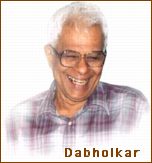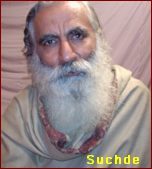The 10 Guntha Project:
Guntha is a traditional measure of land in Maharashtra. 40 gunthas make an acre. Shripad Dabholkar's critical analysis of the interaction between plants, sun light and physical organic requirements convinced him that 'modern' agriculture was wasteful and unprofitable, and therefore forbidding.
If one were truly scientific, farming can be simple and profitable. Dabholkar called it Natu Eco [pronounced, 'natcheko'] farming. It is this knowledge that he took to the farmers of Maharashtra, to revolutionise grape and mango growing in small lots all across the state. One of his revolutionary beliefs was that a family of five can live well on 10 Gunthas or 1/4 acre.

G.G. was a great friend of Dabholkar and sought him out to do something for poor Adivasis who are generally left to fend for themselves on marginal lands. After Dabholkar's death, his long-term disciple Deepak Suchde has been a passionate evangelist of Natu Eco farming. At the Yusuf Meherally Centre, Deepak Suchde, funded by the Dr Malpani Trust, has established a pilot 10-G project to demonstrate its premises. These can be summarised broadly as follows:
§ Almost any terrain can be farmed : roof-tops, barren rock and derelict land. All you need is access to a lot of biomass. Cow-dung, -urine and small quantity of jaggery are fermented for three days to get what is known as Amrit Pani in Natu Eco farming. Then green and dry crushed biomass is pickled in the Amrit Pani for a day or two. The drained mass, crawling with soil animals is layered with a little earth, wood ash from cooking and piled 1 foot high. In 45 days, this turns into sweet smelling nursery soil or Masala Mitti in Natu Eco.
§ Productive root system of plants and trees are only 10" deep. The deeper and wider root system you find in nature are for anchoring the plant. So, if you propped a plant, a foot of enriched soil [or, Masala Mitti] is enough. The plant produces physical material from sunlight and atmospheric carbon and nitrogen; only micro-nutrients are sought from the soil.
§ For optimum photosynthetic efficiency of plants and trees, luxurious canopies are unnecessary and only increase transpiration. Careful attention is paid to canopy management by considered trimming and pruning.
§ Per square foot of Natu Eco farm, only one litre of water is required for ten days. For 10-G or 10,000 sq.ft, water requirement is only 1,000 lpd. This can be harvested from rain, supplemented by intensive recycling of all gray water.
§ Apart from the initial setting-up cost, a Natu Eco farmer needs no cash to buy anyhing from outside. He can produce all grains, vegetables, fruits, herbs, oilseeds and fuel wood for a family of five and have surpluses to generate a small cash income.

The 10-G plot designed by Deepak Suchde at Panvel, draws from Permaculture for lay-out, and adheres to Dabholkar's ideas in practice. Tall trees are planted along the edge, where a hedge of Vettiver prevents run-off of top soil. The !0-G are divided as follows: 1 G each for a family homestead; for workshop and stores; for cattle and chicken; for fruit trees; for paddy and other grains; for a nursery; for water storage; for cotton and fibres; for fast growing fuel wood. Half Guntha each are reserved for spices and oil seeds.
The pilot at Panvel is just over a year old and already fruit and vegetables are regularly produced. The first attempt at growing rice was washed away by heavy rains. Paddy has been sown again. The entire soil was close to lateritic. Judiciously placed Masala Mitti piles are the bed on which all plants grow. No electricity is used. All watering is by hand. Even for paddy.
Deepak Suchde has just started to develop a large parcel of land in Madhya Pradesh. He is available as a professional Natu Eco consultation. He can be contacted over his mobile [0-94224-43390] or email [deepak_suchde@rediffmail.com]. Dabholkar's definitive book 'Plenty For All' is available from Suchde, for Rs.450 each [-which includes postage within India]. Video CDs on the 10-G project are also available from him. Enquire for prices.
Firm focus:
Amidst all this, the steady passion for 'total change' has not dimmed in G.G.. He has said elsewhere:
"We have come to the conclusion that constructive work of a million-plus voluntary organisations, which have two-crore workers and mobilise nearly Rs.1,800 crores annually, has not changed society; it has only applied some balm to the poor and to some extent done what the state should do. In a sense, this has only prevented the sensitive and idealistic youth from doing some basic work. Reflecting on this, the Meherally Centre came to realise that if sangharsh [struggle] is combined with rachna [creative thought], basic changes will occur.
"During the freedom movement people accepted many new values much more easily and the same happened during the JP movement. Hence there is a need for sangharsh with rachna to effect basic changes in society. In view of this, the centre established the Yusuf Meherally Biradari to promote communal harmony and fight injustice."
